Koro people, Gbene Cup, Moyenne Bénoué, Nigeria
Pagina 1 di 1
 Koro people, Gbene Cup, Moyenne Bénoué, Nigeria
Koro people, Gbene Cup, Moyenne Bénoué, Nigeria
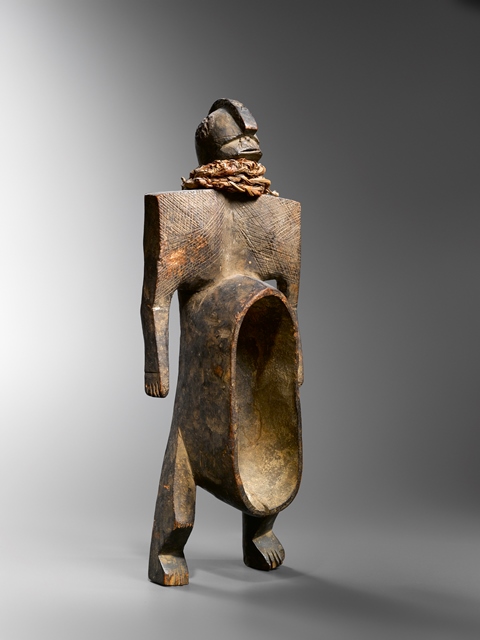
Koro people, Gbene Cup, Moyenne Bénoué, Nigeria
Beginning of XX secolo
Wood, vegetal fibres, abrus seeds.
H.16,5 in/ 42 cm
Private collection, Milan
Photo: Hughes Dubois and Joaquin Pecci
Arti delle Mani Nere All Rights Reserved
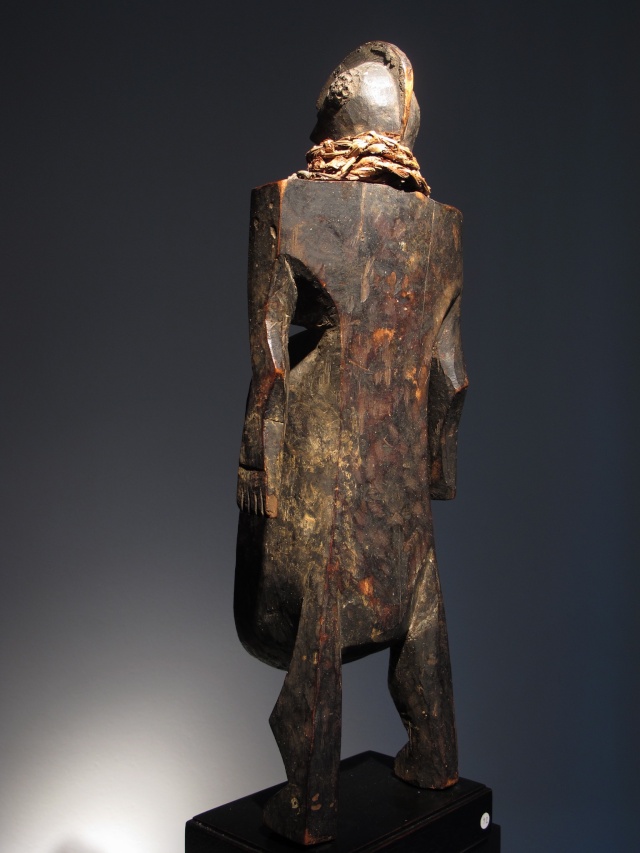
Provenance:
- Private California collection, USA
- Galerie Joaquin Pecci, Bruxelles
Exhibition:
- Scarification, Galerie Joaquin Pecci, Parcours des Mondes 2012
The Koro are a small Kwa-speaking ethnical group of 20.000 people settling in the north-west of the Moyenne Bénoué.
Wrote Fagg in 1970: “These figures, known as gbene, are used for ritual palm-wine drinking once a year during a ceremonial sacrifice and also at second burials”.
Selon Roy Sieber, "ce type de coupe était utilisé durant les sacrifices cérémoniels et les rites funérailles, pour bière ou du vin de palme".
Selon Marla Berns et Richard Fardon, "ce double bol, gbene, est utilisé dans le cadre de célébratons funéraires ou de mascarades, et permet à deux personnes de boire en même temps".
The figure is characterized by primitive aesthetic - almost wild – of the shapes, typical feature of nigerian art; in this case however the brutality that often found in other cups gives way to the refined geometries.
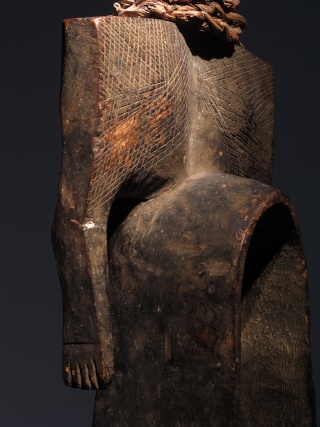
The face with expression masculine, proud and solemn, is obtained through cuts that form the eyes and mouth. The hair is a simple comb and unique decorative elements are given from the abrus seeds that adorned the sides of the head.
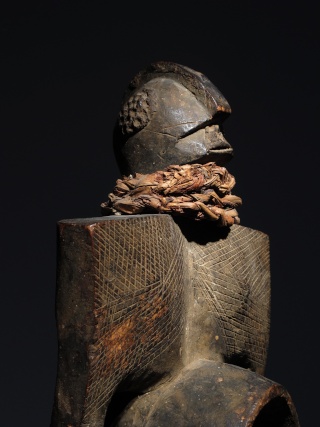
A weave of fibers separates the head from the mighty chest, in which the game of plans and empty is accentuated by the scarification that mark the volumes.
The cavity for containing the wine, is so integrated into the rest of the sculpture to make us forget that we're watching a cup.

The position of the legs seem quite ready for an upcoming move.

Bibliography:
- Fagg W., "African Sculpture", Washington, D.C.: International Exhibitions Foundation, 1970:58, #51
-Neyt, F.- Désirant, A. “ Les Arts de la Benue aux racines des traditions” Editions Hawaiian Agronomics, Belgique, 1985
-J. Kerchache, J.-L. Paudrat, L. Stephan, L’Art Africain, Édition Mazenod, Paris, 1988
- Robbins and Nooter, African Art in American Collections, Smithsonian Institution, USA, 1989.
-AA.VV. “ Arts du Nigeria”, Réunion des Musées nationaux, Parigi, 1997
-Berns, M.C., Fardon, R., Kasfir, S.L and AA.VV “ Central Nigeria Unmasked: Arts of Benue River Valley”, Fowles Museum at Ucla, Los Angeles, 2011
Koro people, Coppa Gbene, Moyenne Bénoué, Nigeria
Inizi del XX secolo
Legno, fibre vegetali, semi d'abrus
H. 42 cm
Coll. privata Milano
Foto Hughes Dubois e Joaquin Pecci
Arti delle Mani Nere All Rights Reserved

Provenienza
- Collezione privata californiana, USA
- Galerie Joaquin Pecci, Bruxelles
Esposizioni
-Scarification, Galerie Joaquin Pecci durante Parcours des Mondes 2012
I Koro sono un piccolo gruppo etnico di lingua Kwa di 20.000 persone, stabilite nel nord-ovest della Moyenne Bénoué.
Ha scritto Fagg nel 1970: “Queste figure, conosciute come gbene, sono utilizzate nel rituale di bere vino di palma una volta l'anno durante un sacrificio cerimoniale o per le sepolture”.
Secondo Roy Sieber, "ce type de coupe était utilisé durant les sacrifices cérémoniels et les rites funérailles, pour bière ou du vin de palme".
Secondo Marla Berns et Richard Fardon, "ce double bol, gbene, est utilisé dans le cadre de célébratons funéraires ou de mascarades, et permet à deux personnes de boire en même temps".
La figura è caratterizzata da un’estetica primitiva - quasi selvaggia - delle forme, tipica dell’arte nigeriana; in questo caso però la brutalità che spesso si ritrova in altre coppe cede il passo a delle raffinate geometrie.
Il viso dall’espressività maschile, orgogliosa e solenne, è ottenuto tramite fessure che formano gli occhi e la bocca. La capigliatura è una semplice cresta e gli unici elementi decorativi sono dati dai semi d’abrus che adornavano i lati del cranio.
Un intreccio di fibre separa la testa dal possente petto, in cui il gioco di piani e vuoti è accentuato dalle scarificazioni che ne marcano i volumi.
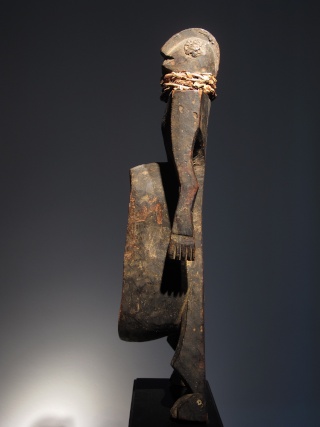
La cavità destinata a contenere il vino, risulta talmente integrata nel resto della scultura da far dimenticare che si sta osservando una coppa.
La posizione delle gambe sembra poi pronta ad un imminente moto.
Bibliografia:
-Fagg W., "African Sculpture", Washington, D.C.: International Exhibitions Foundation, 1970:58, #51
-Neyt, F.- Désirant, A. “ Les Arts de la Benue aux racines des traditions” Editions Hawaiian Agronomics, Belgique, 1985
-J. Kerchache, J.-L. Paudrat, L. Stephan, L’Art Africain, Édition Mazenod, Paris, 1988
-Robbins and Nooter, African Art in American Collections, Smithsonian Institution, USA, 1989
-AA.VV. “ Arts du Nigeria”, Réunion des Musées nationaux, Parigi, 1997
-Berns, M.C., Fardon, R., Kasfir, S.L and AA.VV “ Central Nigeria Unmasked: Arts of Benue River Valley”, Fowles Museum at Ucla, Los Angeles, 2011.
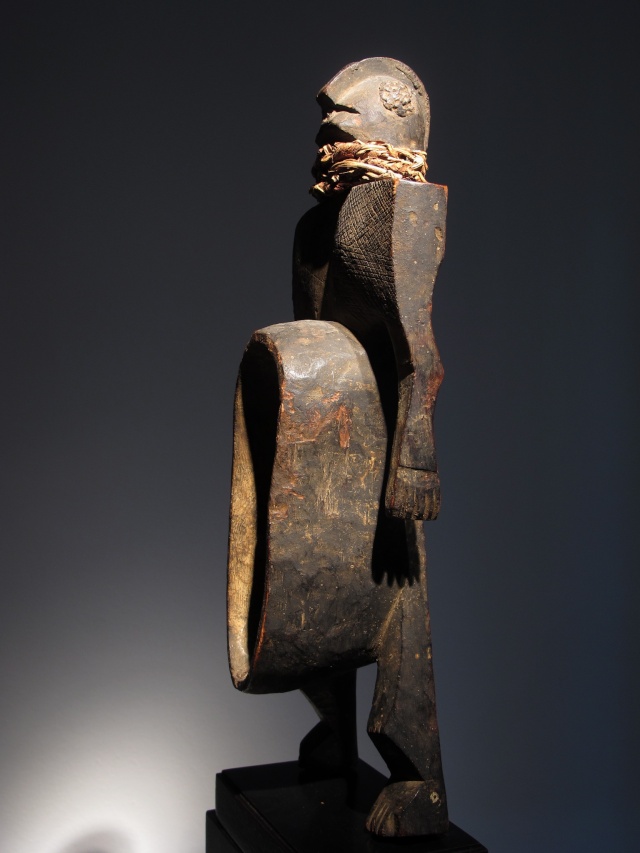
 Argomenti simili
Argomenti simili» Ogoni (Kana) people, Karipko Mask, Niger Delta, Nigeria
» Igbo people, Ntekpe figure, Northeast Cross River, Nigeria
» Igbo people, Ikenga, Aguleri-Umuleri Area (Igboland North-West), Nigeria
» Ekoi/ Ejagham people, Ekpe society, Skin-covered wood mask headdress, Nigeria, Cross River Region
» Mumuye people, Lagalagana figure, Adamawa Plateau, Muri Division of Adamawa Province, Nigeria
» Igbo people, Ntekpe figure, Northeast Cross River, Nigeria
» Igbo people, Ikenga, Aguleri-Umuleri Area (Igboland North-West), Nigeria
» Ekoi/ Ejagham people, Ekpe society, Skin-covered wood mask headdress, Nigeria, Cross River Region
» Mumuye people, Lagalagana figure, Adamawa Plateau, Muri Division of Adamawa Province, Nigeria
Pagina 1 di 1
Permessi in questa sezione del forum:
Non puoi rispondere agli argomenti in questo forum.
 Indice
Indice